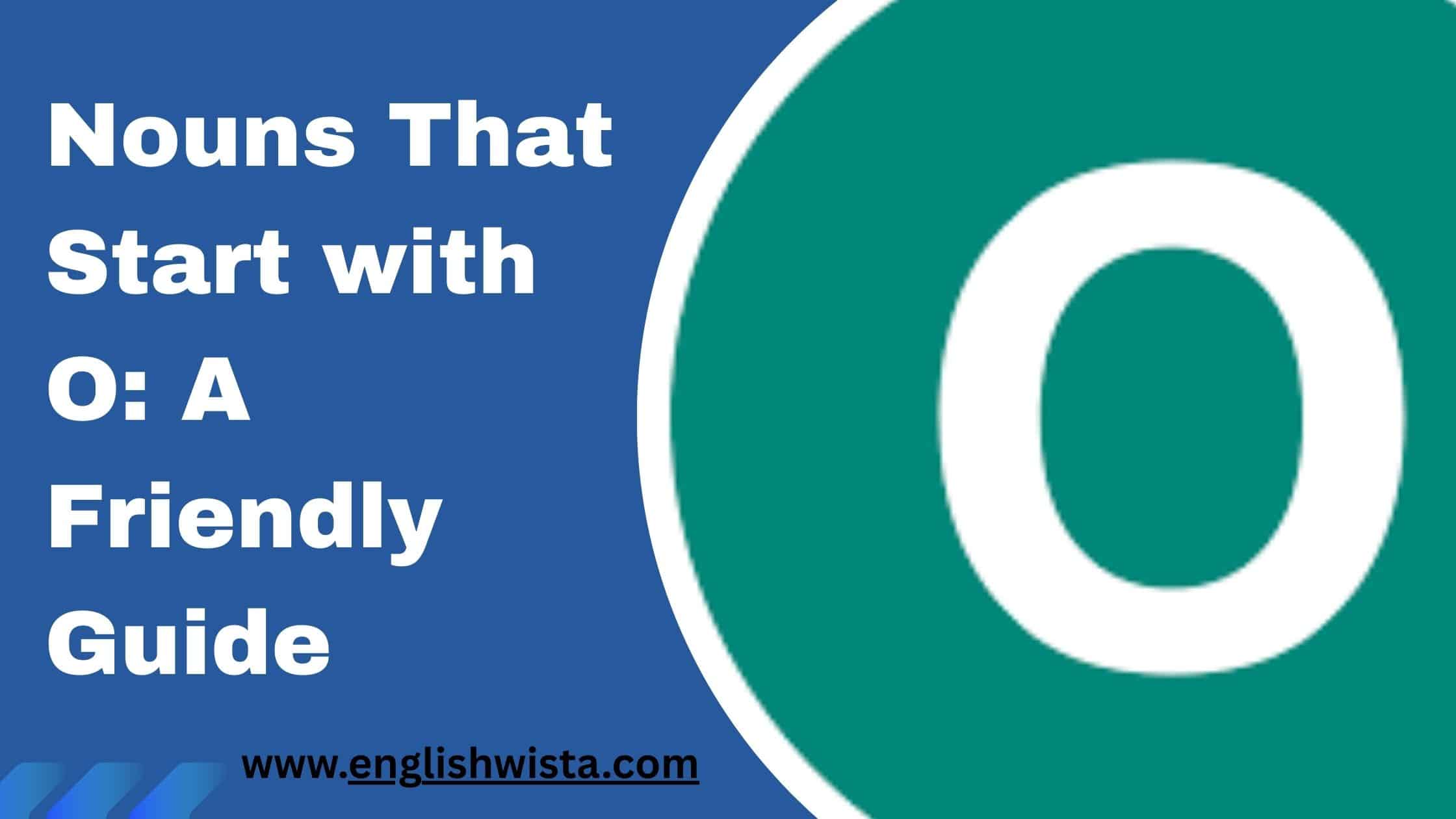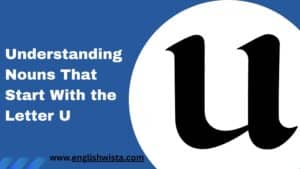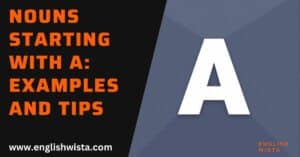Have you ever noticed how many everyday words start with the letter O? From objects you can touch, like orange and oven, to ideas you can feel, like optimism and opinion, nouns starting with “O” show up in our conversations all the time.
In this article, we’ll take a fun and easy journey through nouns beginning with “O.” Don’t worry we’ll keep everything simple, clear, and beginner-friendly. If you’re just starting to learn English, or if you simply love exploring words, this guide is for you.
We’ll look at what nouns are, explore lots of examples starting with “O,” break them into categories, and even add fun facts to make things lively. By the end, you’ll have a strong sense of how these nouns work and how you can use them in your own sentences.
Let’s dive in!
What Is a Noun?
Before we focus on “O,” let’s quickly refresh our memory. A noun is a word that names a person, place, thing, or idea. For example:
- Person: Oliver, officer, orphan
- Place: office, ocean, orchard
- Thing: oven, orange, ornament
- Idea: opinion, opportunity, optimism
So when we talk about nouns starting with “O,” we’re talking about a mix of names, objects, locations, and even abstract feelings or concepts that all begin with this friendly round letter.
Why Focus on Nouns Starting with O?
The letter O is special because:
- It’s a vowel, and vowels appear in many words.
- Many “O” nouns are common and useful in daily life.
- Some “O” nouns carry strong feelings or big ideas, like obstacle or opportunity.
By learning these nouns, you’ll expand your vocabulary and sound more natural when speaking or writing in English.
Common Everyday Nouns Starting with O
Let’s start with the most familiar words. These are nouns you may already know or hear often.
- Orange: a fruit and also a color.
- Oven: a kitchen appliance used for baking or roasting.
- Office: a place where people work.
- Ocean: the huge body of salt water covering most of the Earth.
- Oil: a liquid used in cooking, fuel, or machines.
Example Sentences
- I put the cake in the oven.
- She painted her room bright orange.
- He works in a large office downtown.
- We swam in the ocean during our trip.
- The car needs more oil.
Notice how each noun fits naturally into daily conversations.
People and Occupations Starting with O
Some nouns describe people. These can be names or job titles.
- Officer: someone who works in the police or military.
- Orphan: a child without parents.
- Operator: a person who runs or controls a machine or system.
- Observer: someone who watches carefully.
- Owner: a person who owns something.
Example Sentences
- The officer helped the tourists find their way.
- The kind family adopted an orphan.
- The machine operator fixed the problem quickly.
- An observer noticed the small details others missed.
- The restaurant owner welcomed the guests warmly.
Places That Start with O
The letter “O” also introduces us to some interesting places.
- Office: workplace.
- Orchard: a field where fruit trees grow.
- Outpost: a distant or remote station.
- Observatory: a building used for studying stars and planets.
- Opera house: a theater for operas and performances.
Example Sentences
- The farmer owns an apple orchard.
- The soldiers built an outpost in the mountains.
- We visited the observatory to look at the stars.
- The new opera house attracts many visitors.
Objects and Things Starting with O
Here are nouns for things you can touch, hold, or see.
- Ornament: a decoration.
- Outlet: a power socket or a store selling goods at lower prices.
- Oar: a tool for rowing a boat.
- Oxygen tank: a container for holding oxygen.
- Overcoat: a long coat worn over clothes.
Example Sentences
- The Christmas tree is full of shiny ornaments.
- Plug the charger into the wall outlet.
- He rowed the boat with a wooden oar.
- The climbers carried an oxygen tank to the top of the mountain.
- She wore a heavy overcoat in winter.
Ideas and Feelings Starting with O
Not all nouns are things you can touch. Some are ideas or feelings.
- Opinion: what someone thinks or believes.
- Opportunity: a chance to do something.
- Optimism: the feeling of hope and positivity.
- Obstacle: something that gets in the way.
- Obligation: a duty or responsibility.
Example Sentences
- Everyone has a different opinion about the movie.
- This is a great opportunity to learn.
- His optimism inspired the whole team.
- A big rock was an obstacle in our path.
- Parents have an obligation to care for their children.
Is “Orange” Singular or Plural?
Good question! Like many nouns, orange can be both singular and plural.
- Singular: I ate an orange.
- Plural: We bought three oranges.
This pattern is common among nouns starting with “O.” For example:
- Opinion → Opinions
- Opportunity → Opportunities
- Obstacle → Obstacles
Just add -s or -es for the plural in most cases.
Word Origins: Where Do O-Nouns Come From?
Many nouns starting with “O” have interesting histories.
- Orange: from the Old French orenge, originally from the Arabic nāranj.
- Office: from Latin officium, meaning “duty” or “service.”
- Ocean: from Greek Okeanos, the god of the great river thought to encircle the Earth.
- Opera: from Latin, meaning “work” (because an opera is a “work of art”).
Knowing these origins can make the words more memorable and fun to learn.
Fun Facts About O-Nouns
- The word oxygen comes from Greek and means “acid-former,” because early scientists thought it created acids.
- Orphan is one of the oldest “O” words in English, appearing before the 12th century.
- The word octopus (another great “O” noun) comes from Greek and literally means “eight foot.”
Practical Exercise: Try Using O-Nouns
Here’s a little practice for you. Try to fill in the blanks with the correct “O” noun:
- The farmer picked apples from the __________.
- Please give me your honest __________ about the project.
- We swam across the __________ during summer vacation.
- She placed a shiny __________ on the Christmas tree.
- The police __________ helped the lost child.
(Answers: orchard, opinion, ocean, ornament, officer)
Building Your Vocabulary with O-Nouns
Here’s a quick list of additional “O” nouns to add to your vocabulary:
- Octagon: a shape with eight sides.
- Oasis: a fertile place in the desert.
- Outfit: a set of clothes.
- Outcome: the result of something.
- Outline: the main points of a plan or story.
The more you practice these words in sentences, the more natural they will feel.
Conclusion
Nouns starting with “O” are all around us. They can be people (officer), places (office), objects (ornament), or even ideas (opportunity). Some are simple and common, like orange or oven. Others are bigger and more abstract, like optimism or obligation.
By learning these words, you’re not just memorizing vocabulary you’re giving yourself new tools to express thoughts, feelings, and experiences. Remember: practice makes perfect. Try using “O” nouns in your daily conversations, writing, or even small language games.
So next time you see the letter “O,” think of it as an opportunity to learn something new!



